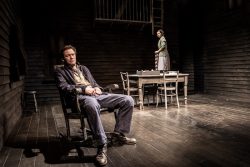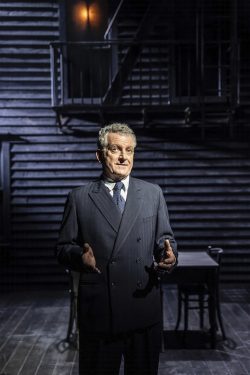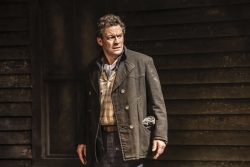 JUST very occasionally in a long life of reviewing plays, you find yourself watching something that you know is special. So special that it will stay in your memory forever, but more importantly will make an indelible mark on all who see it.
JUST very occasionally in a long life of reviewing plays, you find yourself watching something that you know is special. So special that it will stay in your memory forever, but more importantly will make an indelible mark on all who see it.
Arthur Miller’s 1955 play A View from the Bridge must have made that sort of impact when it was first staged, and now we have a production, directed by Lindsay Posner, that has set a new standard for performance. Opening at Bath Theatre Royal’s Ustinov Studio, where it runs until 16th March before transferring to London’s Haymarket Theatre, it stars Dominic West as the central character, Eddie Carbone, a longshoreman of Italian origins who lives in Brooklyn and scuttles for work loading and unloading the ships that come into the New York port.
 Many productions of the play have concentrated on the iconic role of Eddie at the expense of the other characters, but here everyone is given meticulous attention, and is performed by accomplished actors who inhabit not just the story but the whole background of the period in which it is set and the Italo-American community.
Many productions of the play have concentrated on the iconic role of Eddie at the expense of the other characters, but here everyone is given meticulous attention, and is performed by accomplished actors who inhabit not just the story but the whole background of the period in which it is set and the Italo-American community.
 Miller employs the frequent American device of using a narrator to introduce his characters. Here it is the lawyer Alfieri, whose own Italian heritage gives him an insight into the inevitably fatal consequences for the client who comes to ask advice about his niece’s new boyfriend. Beautifully played by Martin Marquez, Alfieri is as powerless as a Greek chorus to influence the future for this passionate man who infuriates and scares him, but who he has come to love.
Miller employs the frequent American device of using a narrator to introduce his characters. Here it is the lawyer Alfieri, whose own Italian heritage gives him an insight into the inevitably fatal consequences for the client who comes to ask advice about his niece’s new boyfriend. Beautifully played by Martin Marquez, Alfieri is as powerless as a Greek chorus to influence the future for this passionate man who infuriates and scares him, but who he has come to love.
In June, Eddie and his wife Beatrice are living in a tenement in Red Hook with Beatrice’s late sister’s daughter Catherine. She is 17 years old, devoted to her aunt and her uncle Eddie, who have brought her up since her mother’s death. She wants to get a job, but Eddie has very clear ideas of where she should work and who she should associate with. He has worked to improve her lot in life. The Carbones are waiting for the arrival of Beatrice’s cousins Marco and Rodolpho from Sicily, coming under the cover of darkness from the ships as part of an illegal immigration racket organised by Cosa Nostra. Italy might have history and sun and citrus fruits, but there is no work for the men, and the elder cousin’s wife and four children are starving. America is a land of opportunity, and the community of longshoremen’s families have traditionally “helped” by giving homes to the immigrants landing from the cargo ships.
Quiet and hardworking, the dark Marco is very different from his flamboyant blonde brother, who not only sings and giggles in falsetto but can cook and make dresses – and immediately catches the attention of the impressionable Catherine. Six months later all five are still living in the cramped tenement, and Eddie is at the end of his tether.
 In the intimate confines of the Ustinov Studio, the visceral power of this play is intensified (how lucky we are to see it before it expands onto the wide open Haymarket stage). Any fears that the production will be dominated by the star quality of the international television and film star Dominic West are shattered immediately. He is charismatic and powerful, but this is a huge performance within a strong ensemble. His Eddie Carbone is hefted in Red Hook. Sometimes he goes bowling with the lads, sometimes comes home where Catherine brings the beer he needs after a long day’s work and Beatrice provides the dinner. None of them has noticed how the balance has altered by the time Marco and Rodolpho arrive.
In the intimate confines of the Ustinov Studio, the visceral power of this play is intensified (how lucky we are to see it before it expands onto the wide open Haymarket stage). Any fears that the production will be dominated by the star quality of the international television and film star Dominic West are shattered immediately. He is charismatic and powerful, but this is a huge performance within a strong ensemble. His Eddie Carbone is hefted in Red Hook. Sometimes he goes bowling with the lads, sometimes comes home where Catherine brings the beer he needs after a long day’s work and Beatrice provides the dinner. None of them has noticed how the balance has altered by the time Marco and Rodolpho arrive.
 Kate Fleetwood inhabits Beatrice with a helpless, hopeless strength, and Nia Towle’s Catherine has all the freshness and burgeoning innocent vigour that make Eddie’s actions understandable and unacceptable.
Kate Fleetwood inhabits Beatrice with a helpless, hopeless strength, and Nia Towle’s Catherine has all the freshness and burgeoning innocent vigour that make Eddie’s actions understandable and unacceptable.
The simmering passion of Pierro Niel-Mee’s Marco is perfectly balanced with Callum Scott Howells’s exuberant Rodolpho, a truly peculiar addition to the family, but an endearingly eager one.
There is not a moment when the tension and power of Miller’s story is not tangible in this magnificent production, perfectly balanced and brilliantly performed.
GP-W
Photographs by Johann Persson